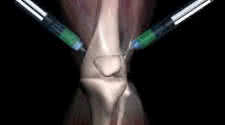Weak Knees? Hylan Injections to Decrease Arthritic Changes in the Knees

Latest Science and Research for Advancement
If you're into pumping iron, you're no stranger to hard work. You also know that if you push it too hard, you might end up with problems like
rotator-cuff-tendinitis, bursitis, and neck and knee pain. All of this can bring your training to a screeching halt. But if you suffer from knee
weakness and swelling due to previous injury or early signs of arthritis, relief may he in sight.
Russell E. Windsor, MD, orthopedic surgeon and sports-medicine specialist at New York's Hospital for Special Surgery is working with hylan, a
viscous injectable material made from hyaluronao (a naturally occuring polysarcharide) that closely simulates normal joint fluid and can protect
existing knee cartilage and slow deterioration. If your father suffered from arthritis, for example, Windsor says you have a genetic predisposition
to the disease. Yet he notes that you can do something about it: "Strength training supported with adequate stretching and aerobic fitness to avoid
tearing the musculotendon units keeps muscles strong around the joint, which will make you less likely to injure that joint."
Looking a bit closer at the mechanics of it all, Windsor explains: "It's like a person jumping 4 feet to the ground and landing on his feet. If he's
in good condition, the leg muscles act as shock absorbers to lessen the force of impact. Energy is absorbed by the elasticity of the muscles
coordinating in a way to remove force from the bony surface of tile knee joints." In this example, the joint cartilage acts as a complex sponge. 'As
the body compresses cartilage, fluid is removed from it like a sponge," Windsor says. "When you unweight the joint, fluid returns." 1-lylan is injected
directly into the joint and moves into this spongelike area of cartilage where the synovial fluid may be lost, thus slowing signs of arthritis.
Promising Treatment
Hylan has shown to be effective in reducing pain and delaying the need for reconstructive surgery in active baby boomers who experience mild to moderate joint pain, or in cases of previous ligament trauma. In some cases, the need for surgery may be eliminated entirely If the treatments don't work sufficiently, you're no worse off than when you started, and you can still opt for knee replacement if indicated.First introduced in Sweden and Canada and available in the United States only since August 1997, hylan injections are marketed under the brand names Synvisc (WyethAyerst) and Hyalgan (OrthoLogic). Synvisc was developed to display physical properties comparable to synovial fluid found in healthy joints, and is administered directly into the knee joint in a series of three treatments spaced one week apart. Hyalgan is used in a series of five injections given one week apart. Some of Windsor's patients report relief after just one treatment.
Clinical studies indicate that a treatment course can offer pain relief for up to six months or more in some patients; if needed, the series can be repeated after six months. If no significant improvement is seen after completing one course, a second course wouldn't be indicated. Since this treatment is made from a natural substance and isn't considered a drug, this innovative therapy has no real downside. Windsor says allergic reactions are rare to aonexistent in his practice.
If All Else Fails
For bodybuilders whose knees don't respond to the customary modes of relief, such as simple analgesics and anti-inflammatory drugs like acetaminophea and naprosyn, or repeated cortisone injections to control joint swelling, this new medical technology offers solutions to maintain an optimal range of activity. Frances McGihhon, RN, NP, at Beth Israel Medical Center in New York, explains: "Long-term anti-inflammatory nonsteroidal medications can predispose you to more bleeding tendencies, and can be irritating to the stomach and toxic for the kidneys. Patients are looking for alternatives to surgery that can safely decrease the progression of arthritic changes in the knee and thereby improve their quality of life."Hylan injections are now FDA-approved only for the knee, hut studies are under way so it may obtain approval for injections to the shoulders and hips in the near future.